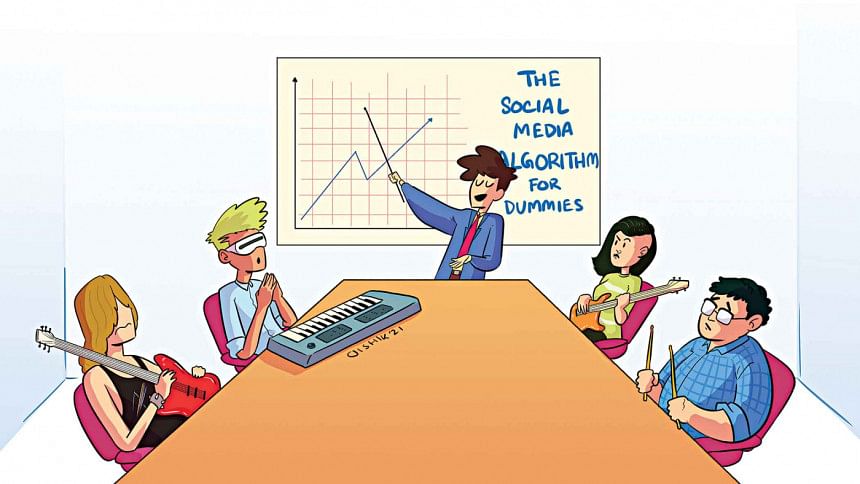Musicians versus analytics

It will not be a stretch to say that releasing new music is easier than ever before—with little to no hurdles if you have a song ready to go, and access to either a third-party distribution app, or a manager who has access to the same.
Amidst the Covid-19 crisis, musicians continuously stepped up with virtual releases, helping listeners overcome the emotional anguish that comes with months of continuous social distancing. A study of 2,000 people conducted by OnePoll, a market research company in conjunction with Harman, stated that it was the number one reprieve for people to cope with the pandemic in an article titled "The power of music lasts a lifetime", published on June 17, 2020.
However, musicians now are battling social media analytics to differentiate themselves, a problem that arguably the previous generations did not have to deal with as much. With thousands of releases being lost worldwide due to the lack of reach, artistes face a new uphill battle, which is to make sure that their hard work actually reaches the ears of their fans.
Arekta Rock Band and EIDA are two bands who made quite the impact with their consistent releases over the past two years. Their fandom was particularly solicited by their regular presence on stage and social media. With the absence of stage shows, the bands have had to rely on social media to keep up their reach.
"We are very cautious as to when we will release our next songs," says Sakib Manzur Zihan, the guitarist for both the bands. "Facebook has seen an inexplicable drop in reach, and we have to find out how we can overcome it," he says. Arekta Rock Band released "Arekta Rock Gaan" in the latter half of 2020, which performed decently. However, according to Zihan, the conversion rate from Facebook, when a link from YouTube is shared, is abysmal. "External links do not do as well when shared on the platform. We will try out a few different things, to find out what works best before actually releasing any new songs."
Artistes accustomed to using multiple social media handles to promote themselves have an edge at this time. "I used YouTube's community posts, and interacted with people on my personal Instagram," says Pragata Naoha. The young singer-songwriter uses social media to personally maintain connections with her fans and create a sense of community. "I hosted personal question and answer sessions for my followers, and sometimes sang for them. To be honest, the pandemic gave me some time to make connections through social media, and write new material," she says.
There are proprietary and third-party music data analytics tools to help artists understand their niche in the market. Streaming platforms offer extensive options for artists to track their prowess—Spotify for Artists, Apple Music for Artists and YouTube Studio, among many others. However, while some of these are available to artistes in our country, few are ever extensively used.
The absence of Spotify, and other similar international streaming apps in Bangladesh is quite a peculiar one, since most upcoming artists choose to put their music on these platforms anyway. The reasoning behind it is not complex—the lines between local and international audiences are thinning every day. People who listen to a band from abroad—be it non-resident-Bangladeshis or someone who speaks a different language or belongs to a different community discovering new music—are increasing every day. As a result, up-and-comers in Bangladesh opt out of formal release proceedings locally, and choose these platforms.
Grooveyard released an entire album in English in mid-2020, and put it on platforms like Spotify, Deezer, and Apple Music. "We just wanted to put it out there for listeners," says Ashifur Rahman Chowdhury, the vocalist of the band. "The fact that the music is there for anyone in the world who wants to access it, regardless of the number of streams, feels good."
Ishmamul Farhad is the lead guitarist for popular band Shunno. The young musician has recently been releasing some solo tracks, with appreciation from musicians around him. "I feel stuck in a way, as I am still figuring out the best way to promote them," he says. According to him, the "number's game" is very influential when it comes to social media platforms. "The conversion to subscribers is crucial when it comes to the wire, on YouTube," he says, adding that he will keep building his portfolio to have a strong enough presence as a solo musician.
Singles from Level Five's debut album, "Obosheshey" have blown up in recent times, thanks to the legions of fans covering their songs "60's Love", "Gholate Megh" and "Shotto Mittha," among others. The band, who has had a stop-and-start career on stage since its inception, is a case study on how good music and dedicated fans can drive a band's legacy forward, despite their inactivity.
"I will honestly say that we have not been the most regular when it comes to connecting to our fans," says Razin Halim, the bassist of Level Five. "However, people have shown continuous support for our music, which means that our songs are trending amongst listeners of rock music, even amidst releases from bigger, more popular bands," he says.
Jon Kabir, a celebrated musician and actor, addressed this issue in an episode of his latest podcast. "In days prior, if you wanted to watch a movie, you went to the theatre. If you wanted to read a book, you went to the library, and if you wanted to listen to live music, you went to a concert. Social media today has merged everything, and they are all judged by numbers. How is it that a newly released song would have to compete with content by a motivational speaker?"
Every music career is unique, and a musician's optimal way of reaching out depends on their understanding of their own craft and audience. As the music industry recovers from a devastating pandemic, it will do so by coming to terms with the driving force that is social media, in better ways.
The author is Sub-Editor, Arts & Entertainment, The Daily Star. [email protected]
The illustrator is a cartoonist and a BBA student. [email protected]

 For all latest news, follow The Daily Star's Google News channel.
For all latest news, follow The Daily Star's Google News channel. 



Comments